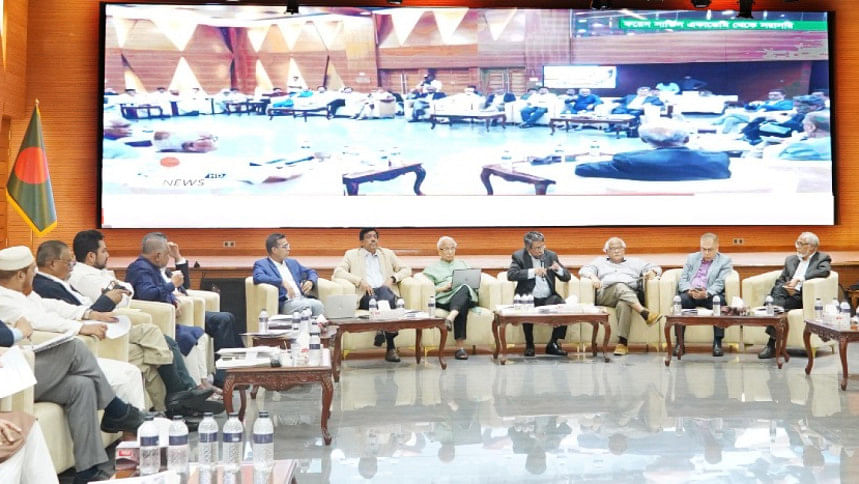Consensus commission: Parties split over how to elect president

Political parties remained poles apart over the presidential election process on the fourth day of the second round of talks with the National Consensus Commission yesterday.
The method of electing the president came up in discussion for the second time in this phase, and still no consensus could be reached.
The BNP rejected the proposal for electing the president through an electoral college comprising lawmakers and local government representatives. The Communist Party of Bangladesh and LDP too stood by the current system, where parliament alone elects the president.
Jamaat-e-Islami and the National Citizen Party, on the other hand, endorsed the idea of an electoral college.
With no agreement in sight yet, the commission will hold another round of discussions on Sunday.
Towards the end of yesterday's session, it also introduced the issue of the prime minister's tenure.
The Constitution Reform Commission proposes that the president be elected by a majority vote in an electoral college made up of: one vote per member of both houses of parliament; one collective vote for each district council (64 votes if there are 64 councils); and one collective vote for each city corporation.
The Election Reform Commission recommends a much larger electoral college, incorporating around 70,000 elected representatives from local government bodies alongside parliament members.
The AB Party, Jatiya Samajtantrik Dal, Khelafat Majlish, Nagorik Oikya, and Jamiat Ulema-e-Islam Bangladesh expressed support for an electoral college system.
Islami Andolan Bangladesh, Nizam-e-Islam, and the Bangladesh Labour Party want a direct presidential election.
Ali Riaz, vice president of the consensus commission, said Sunday's discussions would go back to unresolved issues such as the election system for the president, the prime minister's tenure, the mechanism for electing 100 reserved seats for women in parliament, and the proposed bicameral legislature.
Speaking to reporters, Riaz noted that most parties were in favour of a bicameral system with a 100-seat upper house, but added, "Further discussions are needed on several related matters."
He also acknowledged that full consensus may not be realistic under current circumstances, but stressed that both the commission and the parties were committed to reaching agreements on key reforms.
BNP Standing Committee Member Salahuddin Ahmed told reporters his party supported amending article 70 of the constitution to allow parliament members to vote independently, except on finance bills and no-confidence motions. He added that the BNP advocates a secret ballot in presidential elections to ensure transparency and neutrality.
On the question of a bicameral legislature, he argued that a proportional representation system for the upper house would be "illogical".
Jamaat-e-Islami's Nayeb-e-Ameer Syed Abdullah Muhammad Taher said some progress had been made in the discussions regarding both the presidential election and the PM's tenure. While most parties appeared to favour an electoral college involving lawmakers, he criticised the reform commission's proposal to expand it up to 70,000, including union council representatives.
"We believe some expansion is needed, but not on such a large scale. Covering district councils and municipalities should suffice," he said, adding that his party believes a prime minister should not serve more than two terms.
"Some parties, including the BNP, disagreed. They suggested a PM could return after a break following two consecutive terms. So, there is a slight difference of opinion. But most parties support a total two-term limit [whether consecutive or not]."
Bazlur Rashid Firoz, general secretary of the Socialist Party of Bangladesh, questioned why the PM's office should be exempt from a two-term limit if the presidency isn't.
AB Party Chairman Mojibur Rahman Monju and Gono Odhikar Parishad President Nurul Huq Nur echoed support for a two-term cap on the prime minister's tenure, citing democratic principles and national interest.
National Citizen Party Joint Convener Javed Rasin said his party supported involving local government in the presidential election process. "Presidential election shouldn't depend on the parliament alone. We agree with the concept of the local governments' involvement, which the [election reform] commission has proposed.
"We believe the president should be elected through votes from members at every union level … so that the president is not subservient to any one party."
Around 30 political parties took part in the second phase of talks, which began on June 2, with the National Consensus Commission yesterday.

 For all latest news, follow The Daily Star's Google News channel.
For all latest news, follow The Daily Star's Google News channel. 



Comments